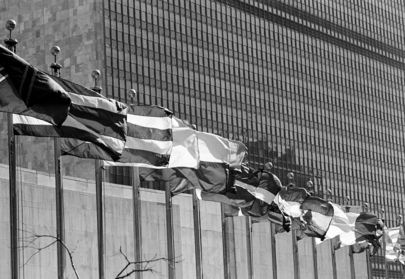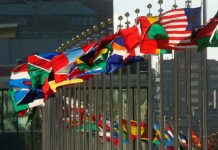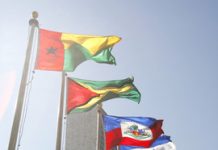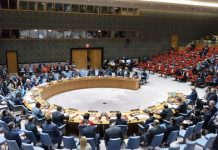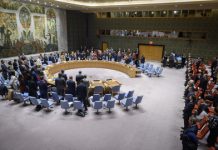“Hell is breaking loose in Lebanon” the UN chief warned, noting that the exchanges of fire along the UN-patrolled line of separation “have expanded in scope, depth and intensity.”
Monday saw Lebanon’s bloodiest day in a generation, as Israel continues to bombard largely Hezbollah-controlled territory, doubling down on the devastating electronic device attacks which killed hundreds last week.
With an appeal for both sides to respect Lebanese sovereignty, Mr. Guterres said that the State “must have full control of its weapons” throughout the country.
“We support all efforts to strengthen the Lebanese Armed Forces”, he added.
Hebbariyeh village in southern Lebanon lies in partial ruins following hostilities across the Blue Line.
The UN chief said the daily violations across the Blue Line were in violation of key Council resolutions 1559 and 1701
Civilians must be allowed to return home
With nearly 200,000 Lebanese now internally displaced, along with more than 60,000 northern Israelis, many lives have been lost since Hezbollah first began firing rockets over the line of separation in support of Hamas in Gaza, he added.
The communities on both sides “must be able to return to their homes and live in safety and security, without fear”, the Secretary-General said.
He applauded all diplomatic efforts taken so far towards escalation and pledged the UN’s continuing support for a ceasefire and increase in humanitarian relief for stricken Lebanese civilians.
“Despite the dangerous conditions, our peacekeepers remain in position”, he said, referring to the UN Interim Force, UNIFIL, although most civilian personnel have temporarily relocated.
“I implore the Council to work in lock-step to help put out this fire”, the UN chief told ambassadors.
“Civilians must be protected. Civilian infrastructure most not be targeted…To all sides, let us say in one clear voice: stop the killing and destruction. Tone down the rhetoric and threats. Step back from the brink.”
He said an all-out war must be avoided at all costs. “It would surely be an all-out catastrophe.”
Israel attempting to make Lebanon ‘a new Gaza’: Algerian Foreign Minister
Once again, Lebanon is facing “flagrant Israeli aggression, brutal aggression and hateful aggression,” said Algerian Foreign Minister Ahmed Attaf.
Foreign Minister Ahmed Attaf of Algeria addresses the Security Council meeting on the situation in Lebanon.
He told the Council that what is happening there is “part and parcel of the policy of escalation” that Israel uses as a deliberate strategy elsewhere in the Middle East.
He said Lebanon is facing an attack on its sovereignty, and its security and stability are being undermined.
“All the elements of the crime have come together now in accordance with Israeli occupation. As they have done in Gaza, they are doing the same in Lebanon,” he said.
“This is a crime against peace,” he continued. “It’s a crime of aggression, a crime against humanity, a crime of war, a genocide. In other words, it is an attempt to change Lebanon and to make it into a new Gaza.”
Nobody wants a repeat of 2006 war: US
United States Ambassador Robert Wood said his country has engaged extensively with all parties in the region since the Council last met to discussion the situation along the Blue Line frontier.
US Ambassador Robert Wood addresses the Security Council meeting on Lebanon.
He recalled that President Biden emphasized to the General Assembly that a diplomatic solution consistent with resolution 1701 remains the only path to durably reverse the cycle of escalation and enable displaced people on both sides to return to their homes.
Mr. Wood said the US has “repeatedly made clear” that the Council cannot ignore the origins of this particular conflict between Israel and Hezbollah.
He noted that hundreds of thousands of Lebanese civilians, and more than 65,000 Israeli civilians, have been displaced as a result of Hezbollah’s decision on 8 October to break the peace that had largely endured along the Blue Line since 2006, when the UN interim force was established.
Furthermore, Hezbollah’s buildup of weapons, many of which are supplied by Iran, and its presence along the Blue Line in defiance of resolutions 1559 and 1701, has long been a source of instability, he added.
Nobody wants to see a repeat of the full-blown war that occurred in 2006, but the path to enduring stability goes beyond ending cross-Blue Line strikes. It must end with a comprehensive understanding relating to the Blue Line that has real implementation mechanisms,” he said.
More to follow…
Source of original article: United Nations (news.un.org). Photo credit: UN. The content of this article does not necessarily reflect the views or opinion of Global Diaspora News (www.GlobalDiasporaNews.com).
To submit your press release: (https://www.GlobalDiasporaNews.com/pr).
To advertise on Global Diaspora News: (www.GlobalDiasporaNews.com/ads).
Sign up to Global Diaspora News newsletter (https://www.GlobalDiasporaNews.com/newsletter/) to start receiving updates and opportunities directly in your email inbox for free.


